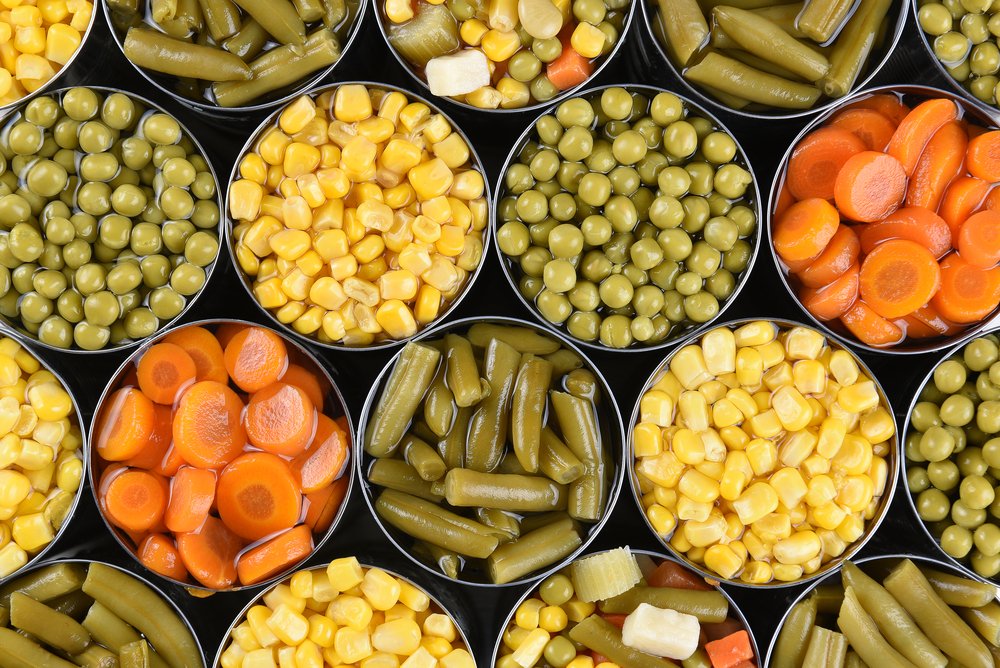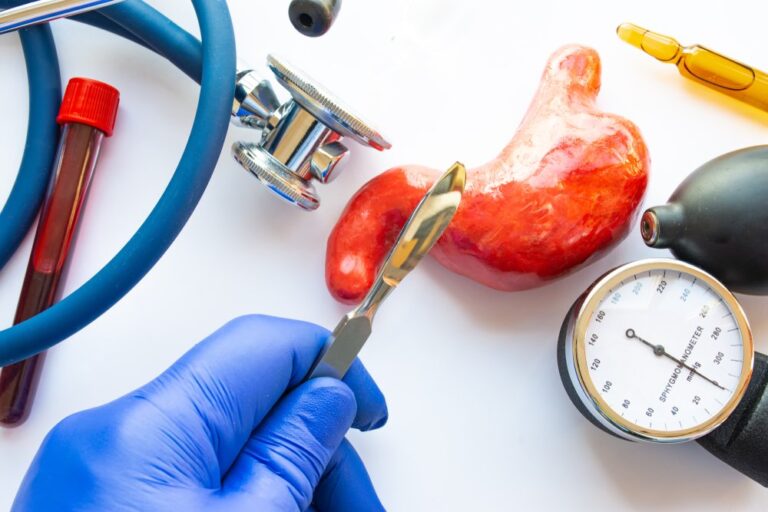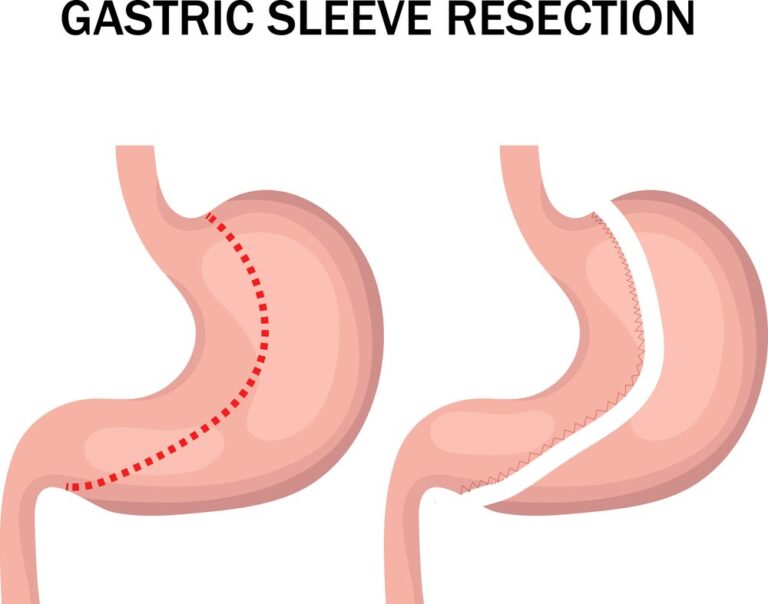It’s imperative not to eat solid food too soon after gastric sleeve surgery. Doing so can negatively impact your recovery process. Following your surgeon’s guidelines and gradually introducing solid foods as per the prescribed timeline is essential to avoid complications related to eating solid food too soon after gastric sleeve surgery.
Get a $1000 Off on Gastric Sleeve in Miami
Signs and Symptoms of Eating Solid Food Too Soon
Eating solid food too soon after gastric sleeve surgery can lead to various signs and symptoms that indicate the need for caution and a potential need to adjust your dietary choices. Here are some signs and symptoms that may arise if solid food is consumed too early:
- Pain and Discomfort: Eating solid foods before your body is ready can cause pain and discomfort in your stomach or the surgical site. This discomfort may range from mild discomfort to sharp or cramping sensations. It is important to listen to your body and pay attention to any pain or discomfort experienced after eating solid foods.
- Nausea and Vomiting: Introducing solid foods too early can overwhelm your reduced stomach capacity, leading to feelings of nausea and an increased likelihood of vomiting. If you experience persistent or frequent episodes of nausea or vomiting after consuming solid foods, it may indicate that your body is not yet prepared to handle them.
- Difficulty Swallowing: Solid foods require more effort to chew and swallow compared to liquid or pureed foods. If you find it challenging to swallow solid foods or if you experience a feeling of food getting stuck or not passing smoothly through your esophagus, it may be a sign that your body is not ready for solids.
- Regurgitation: Eating solid foods prematurely can lead to regurgitation, where partially digested food comes back up into your mouth or throat. This can occur due to the inability of your stomach to properly process solid foods, resulting in food backing up into the esophagus.
- Gastrointestinal Distress: Consuming solid foods too early can cause gastrointestinal distress, such as bloating, gas, abdominal pain, or cramping. These symptoms may be indicative of your digestive system struggling to break down and process solid foods effectively.
- Changes in Bowel Movements: Eating solid foods too soon after surgery can disrupt your bowel movements. You may experience constipation, diarrhea, or irregular bowel habits. These changes can be a result of your body’s difficulty in digesting solid foods or inadequate fluid intake.
If you notice any of these signs or symptoms after consuming solid foods, it is important to consult with your healthcare team. They can evaluate your condition, provide guidance on adjusting your diet, and ensure that you are on the right track for a successful recovery.
Remember, every individual’s healing process is unique, and it’s essential to follow the post-operative dietary guidelines provided by your surgeon or registered dietitian. Gradually introducing solid foods at the appropriate time is crucial for your well-being and the long-term success of your gastric sleeve surgery.

Physical Indicators of Eating Solid Food Prematurely
When solid foods are consumed prematurely after gastric sleeve surgery, there can be physical indicators that suggest the need for caution. It’s important to be aware of these signs, as they can help you identify if you may have eaten solid food too soon. Here are some physical indicators to watch out for:
| Physical Indicators of Eating Solid Food Prematurely |
|---|
| Pain or Discomfort |
| Nausea and Vomiting |
| Difficulty Swallowing or Food Getting Stuck |
| Regurgitation |
| Gastrointestinal Distress |
| Changes in Bowel Movements |
Gastrointestinal Discomfort and Potential Weight Regain
Gastrointestinal discomfort can be a common issue after gastric sleeve surgery and may have implications for potential weight regain. It’s important to be aware of the factors that can contribute to gastrointestinal discomfort and understand how it may impact your weight management efforts. Here’s a closer look at these aspects:
Gastrointestinal Discomfort
Gastrointestinal discomfort can manifest in various ways, including bloating, gas, abdominal pain, indigestion, and changes in bowel movements. These issues can arise due to a variety of factors, such as:
- Eating Too Quickly: Rapid eating can lead to swallowing excess air, which can contribute to bloating and gas. It’s important to slow down, chew food thoroughly, and practice mindful eating.
- Overeating: Consuming large portions or eating beyond the capacity of your smaller stomach can result in discomfort and stretching of the stomach pouch. It’s crucial to adhere to portion control guidelines and listen to your body’s signals of fullness.
- Poor Food Choices: Opting for foods high in fat, sugar, or refined carbohydrates can exacerbate gastrointestinal discomfort. These foods can be harder to digest and may lead to symptoms such as bloating or indigestion. Choosing nutrient-dense, whole foods can help alleviate these issues.
- Lack of Dietary Fiber: Insufficient intake of dietary fiber can contribute to digestive problems, including constipation or irregular bowel movements. It’s important to consume fiber-rich foods such as fruits, vegetables, whole grains, and legumes to promote healthy digestion.
Potential Weight Regain
Gastrointestinal discomfort can indirectly impact weight management efforts and potentially lead to weight regain. Here’s how:
- Emotional Eating: Gastrointestinal discomfort may trigger emotional eating as a means of seeking relief or comfort. This can lead to consuming calorie-dense foods or overeating, negatively impacting weight management goals.
- Reduced Physical Activity: Discomfort and digestive issues may discourage physical activity, leading to a decrease in calorie expenditure. Regular exercise plays a vital role in weight management, so it’s essential to find ways to remain active within your comfort level.
- Poor Nutrient Absorption: Gastrointestinal discomfort can affect nutrient absorption, potentially leading to nutritional deficiencies. Inadequate nutrient intake can impact metabolism and contribute to weight regain.
Managing Gastrointestinal Discomfort and Weight Management
To mitigate gastrointestinal discomfort and support weight management after gastric sleeve surgery, consider the following strategies:
- Follow Dietary Guidelines: Adhere to the recommended post-surgery dietary guidelines provided by your healthcare team. These guidelines emphasize portion control, balanced nutrition, and appropriate food choices.
- Slow and Mindful Eating: Practice eating slowly, chew food thoroughly, and take smaller bites. This allows for better digestion, reduces the risk of discomfort, and promotes satiety.
- Optimize Food Choices: Focus on consuming nutrient-dense foods such as lean proteins, fruits, vegetables, whole grains, and healthy fats. These choices provide essential nutrients while being easier to digest.
- Stay Hydrated: Drink an adequate amount of water throughout the day to support digestion and prevent constipation.
- Regular Physical Activity: Engage in regular physical activity according to your post-surgery capabilities. Consult with your healthcare provider or a qualified fitness professional to determine suitable exercises that align with your needs.
- Seek Support: Engage with a registered dietitian or support groups specializing in post-gastric sleeve surgery to receive guidance, personalized advice, and emotional support on your weight management journey.
By implementing these strategies, you can effectively manage gastrointestinal discomfort and promote long-term weight management success after gastric sleeve surgery. Remember to consult with your healthcare team for individualized recommendations and guidance tailored to your specific needs.

Importance of Following the Recommended Dietary Progression
Following the recommended dietary progression after gastric sleeve surgery is crucial for several reasons. It supports your recovery, helps prevent complications, promotes long-term weight loss, and ensures optimal nutritional intake. Here are key reasons why adhering to the recommended dietary progression is important:
- Surgical Recovery and Healing: The recommended dietary progression is designed to support your body’s healing process after surgery. The initial stages focus on consuming clear liquids and gradually advance to soft foods and solid foods over time. This progression allows your stomach to heal, reduces the risk of complications, and supports a smooth recovery.
- Prevention of Complications: By following the recommended dietary progression, you minimize the risk of complications that can occur when solid foods are introduced too soon.
- Portion Control and Satiety: The dietary progression provides guidance on portion control, helping you adjust to your reduced stomach size. By gradually introducing solid foods and monitoring portion sizes, you can prevent overeating and ensure you feel satisfied after meals. This aspect is crucial for successful long-term weight management.
- Nutritional Adequacy: Following the recommended dietary progression ensures you receive adequate nutrition as you recover from surgery. Each stage of the progression introduces specific foods that provide essential nutrients.
- Adaptation to Lifestyle Changes: Gastric sleeve surgery requires adopting significant lifestyle changes, including dietary modifications.
- Long-Term Weight Loss Success:The dietary progression after gastric sleeve surgery is designed to promote sustainable weight loss. Following the plan and gradually reintroducing solid foods ensures you make appropriate food choices, practice portion control, and develop a healthy relationship with food.
Adhering to the Stages of the Post-Surgery Diet
Adhering to the stages of the post-surgery diet is crucial for a successful recovery and long-term weight management after gastric sleeve surgery. The post-surgery diet is typically divided into several stages, each serving a specific purpose in supporting your healing process and gradual reintroduction of foods. Here’s why adhering to these stages is important:
| Importance of Adhering to the Stages of the Post-Surgery Diet |
|---|
| Surgical Recovery and Healing |
| Minimizing Complications |
| Portion Control and Satiety |
| Nutritional Adequacy |
| Gradual Adaptation to Solid Foods |
| Long-Term Weight Management |
Benefits of Gradual Transition to Solid Foods
Gradually transitioning to solid foods after gastric sleeve surgery offers several benefits for your overall health and well-being. Here are some key advantages of a gradual transition:
| Benefits of Gradual Transition to Solid Foods |
|---|
| Allow Proper Healing and Recovery |
| Adaptation to a Smaller Stomach Capacity |
| Improved Nutrient Absorption |
| Enhanced Digestion and Gut Health |
| Psychological Satisfaction and Food Variety |
| Long-Term Weight Management |
Potential Consequences of Eating Solid Food Prematurely
Eating solid food too soon after gastric sleeve surgery can have several potential consequences that can negatively impact your recovery and overall well-being. It is important to understand these potential consequences in order to prevent complications and ensure a successful post-surgery journey. Here are some possible outcomes of consuming solid food prematurely:
- Discomfort and Digestive Issues: Eating solid food before your stomach has fully healed can lead to discomfort and digestive problems. You may experience pain, bloating, indigestion, nausea, vomiting, or a feeling of fullness even with small amounts of food. These issues can interfere with your recovery process and make it challenging to adhere to the recommended dietary guidelines.
- Stretching of the Stomach Pouch: Introducing solid food too early can stretch the newly created stomach pouch. This can diminish the effectiveness of the surgery by reducing the feeling of fullness and limiting the amount of food you can comfortably consume. It may lead to increased hunger, decreased satisfaction from meals, and potentially contribute to overeating or weight regain.
- Nutritional Deficiencies: Prematurely consuming solid food can hinder your ability to meet your nutritional needs. After gastric sleeve surgery, your body requires nutrient-dense foods in smaller quantities. If you introduce solid foods too soon, you may have difficulty consuming an adequate amount of essential nutrients, which can result in nutritional deficiencies. This can negatively impact your overall health, energy levels, and ability to heal properly.
- Increased Risk of Complications: Eating solid food before your stomach has sufficiently healed can increase the risk of complications. These complications may include gastric leakage, internal bleeding, infection, or injury to the surgical site. Following the recommended dietary progression and allowing your stomach adequate time to heal can help minimize these risks and promote a smoother recovery.
- Weight Regain: Consuming solid food prematurely can affect your weight management efforts. Gastric sleeve surgery aims to promote weight loss by restricting the amount of food you can consume. If you introduce solid foods too early, you may experience increased calorie intake, reduced satiety, and a higher likelihood of weight regain. Adhering to the recommended dietary guidelines and gradually reintroducing solid foods can help support long-term weight management success.
It is crucial to follow the post-surgery dietary guidelines provided by your healthcare team. These guidelines are specifically designed to support your recovery, prevent complications, and optimize your long-term health outcomes. If you have any concerns or questions regarding your diet progression, consult with your surgeon or registered dietitian for personalized guidance and support.
Digestive Issues and Complications
Digestive issues and complications can arise after gastric sleeve surgery, and it’s important to be aware of them for proper management and timely medical intervention. Here are some common digestive issues and potential complications associated with gastric sleeve surgery:
- Nausea and Vomiting: Nausea and vomiting are common side effects following gastric sleeve surgery, especially during the initial recovery period. It can occur due to factors such as overeating, eating too quickly, or intolerance to certain foods. Proper portion control, slow eating, and avoiding trigger foods can help alleviate these symptoms.
- Gastroesophageal Reflux Disease (GERD): GERD may occur or worsen after gastric sleeve surgery. It is characterized by the backward flow of stomach acid into the esophagus, causing heartburn, regurgitation, and discomfort. Lifestyle modifications, such as avoiding certain foods, eating smaller meals, and elevating the head during sleep, can help manage GERD symptoms.
- Dumping Syndrome: Dumping syndrome can occur when food moves too quickly from the stomach into the small intestine. It can result in symptoms such as nausea, vomiting, abdominal cramping, lightheadedness, and diarrhea. To manage dumping syndrome, it is important to eat smaller, more frequent meals, avoid high-sugar or high-fat foods, and stay well-hydrated.
- Stomach Ulcers: Ulcers may develop in the stomach lining after gastric sleeve surgery. They can cause symptoms like abdominal pain, indigestion, bloating, and nausea. Treatment typically involves medications to reduce stomach acid production and promote healing. Avoiding nonsteroidal anti-inflammatory drugs (NSAIDs) and managing stress can help prevent ulcers.
- Stricture Formation: Strictures are narrowings or blockages that can occur in the area where the stomach was stapled during surgery. They can cause difficulty swallowing, pain, and regurgitation of food. Treatment may involve endoscopic dilation to widen the narrowed area or surgical intervention if necessary.
- Leakage: Leakage can occur if the staple line or surgical connections in the stomach are compromised, leading to the leakage of stomach contents into the abdominal cavity. It is a serious complication that requires immediate medical attention. Symptoms may include severe abdominal pain, fever, rapid heart rate, and difficulty breathing.
If you experience persistent or severe digestive issues or suspect complications, it is crucial to consult with your healthcare team. They can evaluate your symptoms, provide appropriate interventions, and guide you through the necessary steps for management and recovery.






